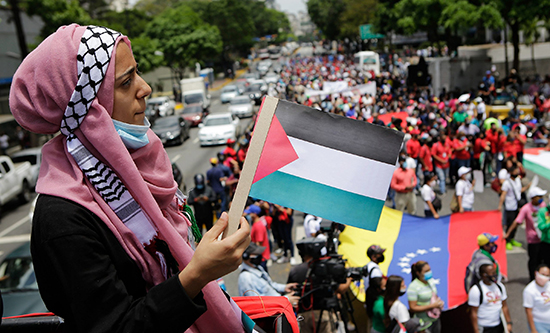‘The peoples that do not know each other, must hurry to get to know each other, like those who are going to fight together’.
– José Martí, Cuban independence fighter
On 8 May 2024 Rock around the Blockade hosted an international online meeting, drawing out the connections between the struggles for self-determination against imperialism in Cuba, Palestine and Venezuela. The meeting was attended by over 100 people from across the globe. FRFI student activists at the Palestine solidarity encampment at Manchester University were also present and contributed to the meeting.
The meeting heard a speech from Ivan Ernesto of the Union of Young Communists in Cuba. He spoke of the deep connections between the Palestinian and Cuban struggles:
‘Cuba’s historical position in defence of self-determination of the Palestinian people has its roots even before the triumph of the revolution [in 1959]. During the votes at the United Nations for separating the then-British mandate of Palestine into two states in 1947, Cuba voted against the creation of the state of Israel. The Cuban delegates emphasised the unfair and illegal deal presented by the officials of the British government… our country also established a Palestinian Embassy in Havana even before the proclamation of independence of Palestine in November 1988.
‘Cuba has also provided scholarship free of charge to over a thousand Palestinians in several fields and specialties. Today more than 1,000 Palestinians have graduated as health professionals and over 400 are currently studying in Cuban classrooms being trained as doctors.’
Next the meeting heard from Khaled Barakat of Masar Badil, the Palestinian Alternative Revolutionary Path Movement. Khaled said:
‘Palestinians always had a true love for Cuba, Ireland and South Africa and even growing up in Palestine as a child we used to think that these countries are so close to Palestine. They’re not far away because geography didn’t matter when it comes to the struggle against occupation. For us as Palestinian children looking at a poster of Fidel Castro, Che Guevara or Nelson Mandela, these are Palestinians who live somewhere else… this is crucially important for people who are fighting such regimes to feel that they are not alone in the struggle.’
Jorge Vilalta from the Venezuelan Movimiento Otro Beta and Alba Movimientos spoke next, highlighting the impact of US economic warfare on the Bolivarian revolution and across the world:
‘In Venezuela Hugo Chavez won the [1999] presidential election and took the Western governments by surprise; they never expected that a military man from the Plains region, which is a peasant and conservative region, a descendant of the indigenous and Afro-Venezuelan peoples, could have could have led the Latin American uprising against imperial power together with other leaders. They have done so by uniting the peoples and governments of the region fighting for social justice and the salvation of the planet: joint programmes and projects were created that address the basic and original needs of the population in areas such as health, education food and housing.
‘We affirm that the cause of the blockade against our country is that Western imperialism could not allow a revolutionary process that managed money and natural resources in abundance to succeed.’
The final speaker was Soma Kisan from the editorial board of FRFI. Kisan pointed out the integral connections between these political struggles: ‘As anti-racists, anti-imperialists, and as socialists, it is our imperative to support movements and countries on the frontlines of anti-imperialist struggle. Their fight is not theirs alone but is part of a broader battle for a just world order.’
This meeting made clear the need to get politically organised in countries like Britain in order to properly support peoples under the boot of imperialism. Don’t just get angry, get active – contact us today to get involved with our anti-imperialist, anti-racist campaigning in Britain!
Jacob Dexter
FIGHT RACISM! FIGHT IMPERIALISM! 300 June/July 2024




